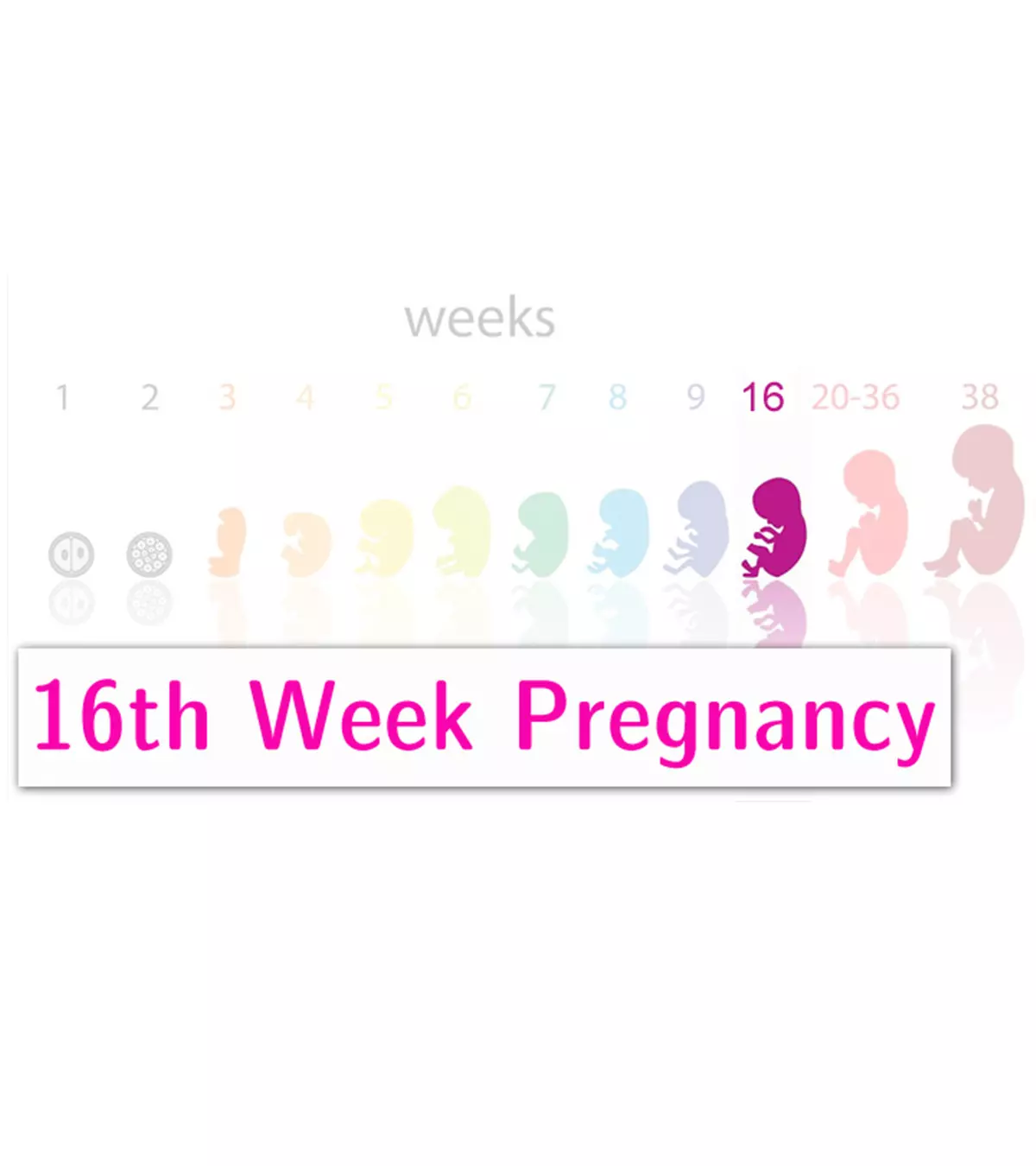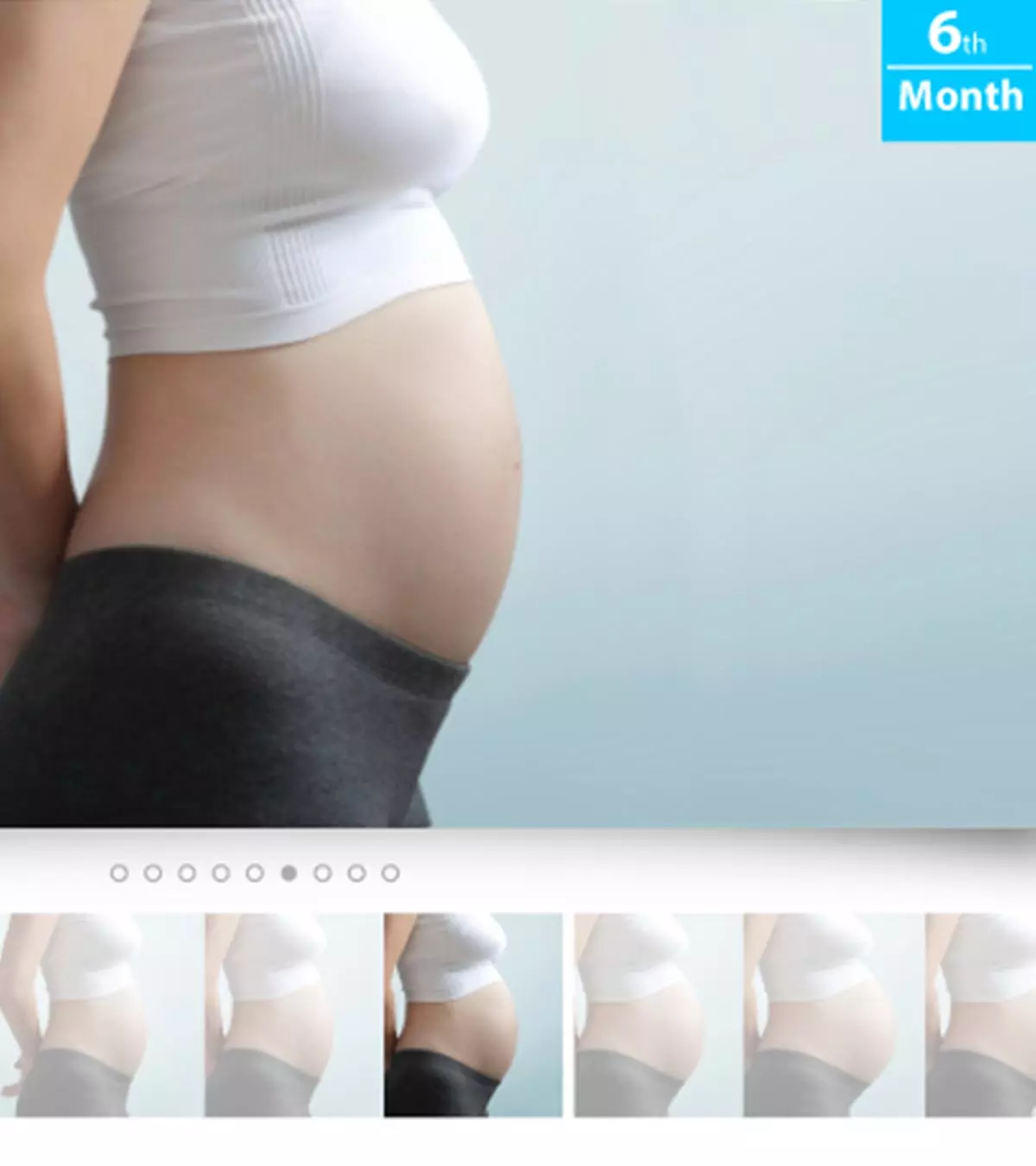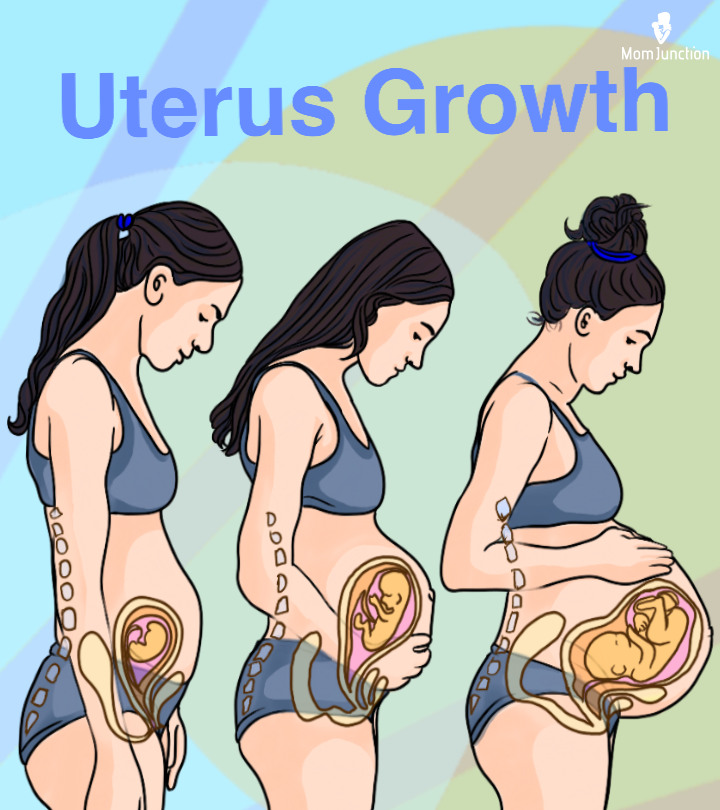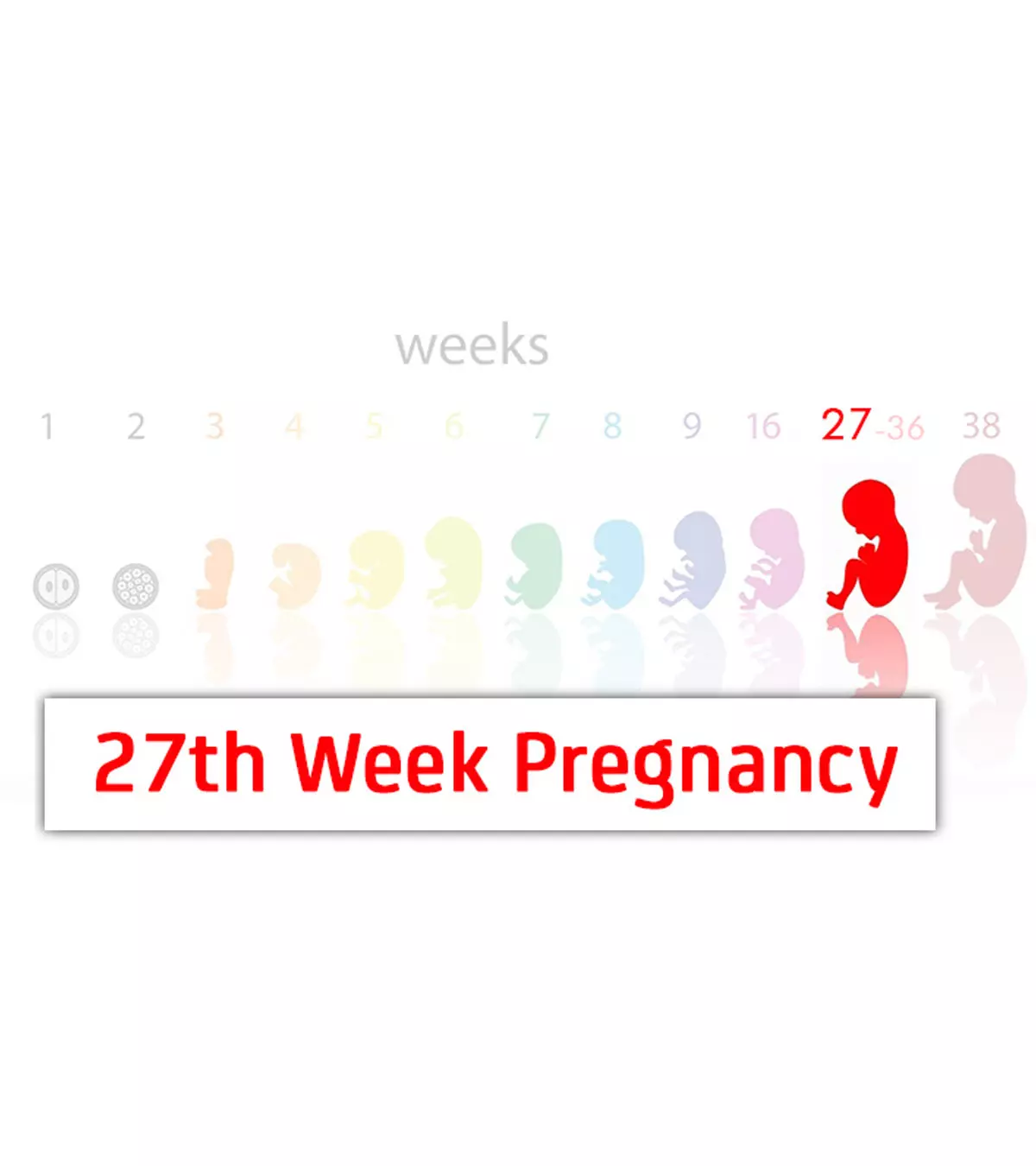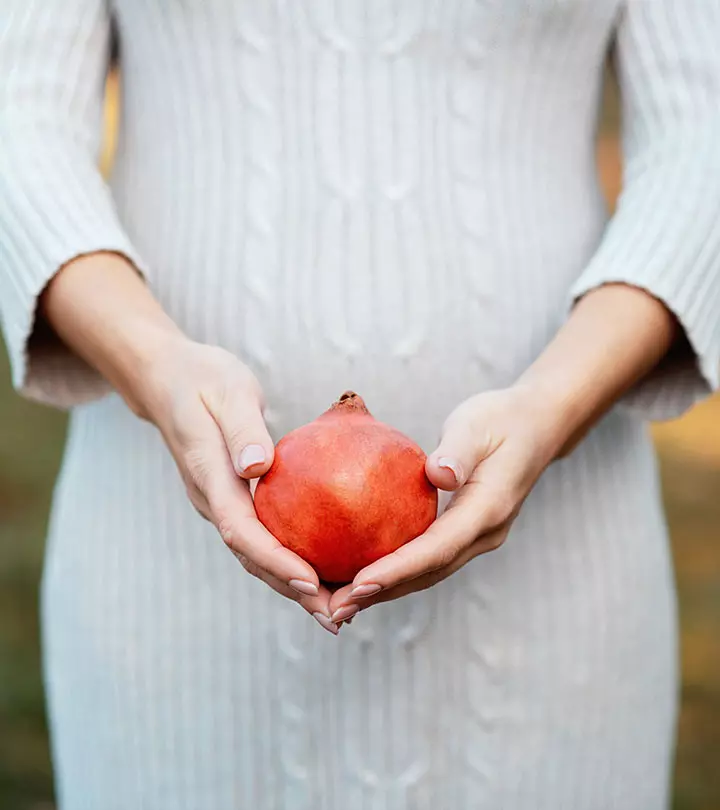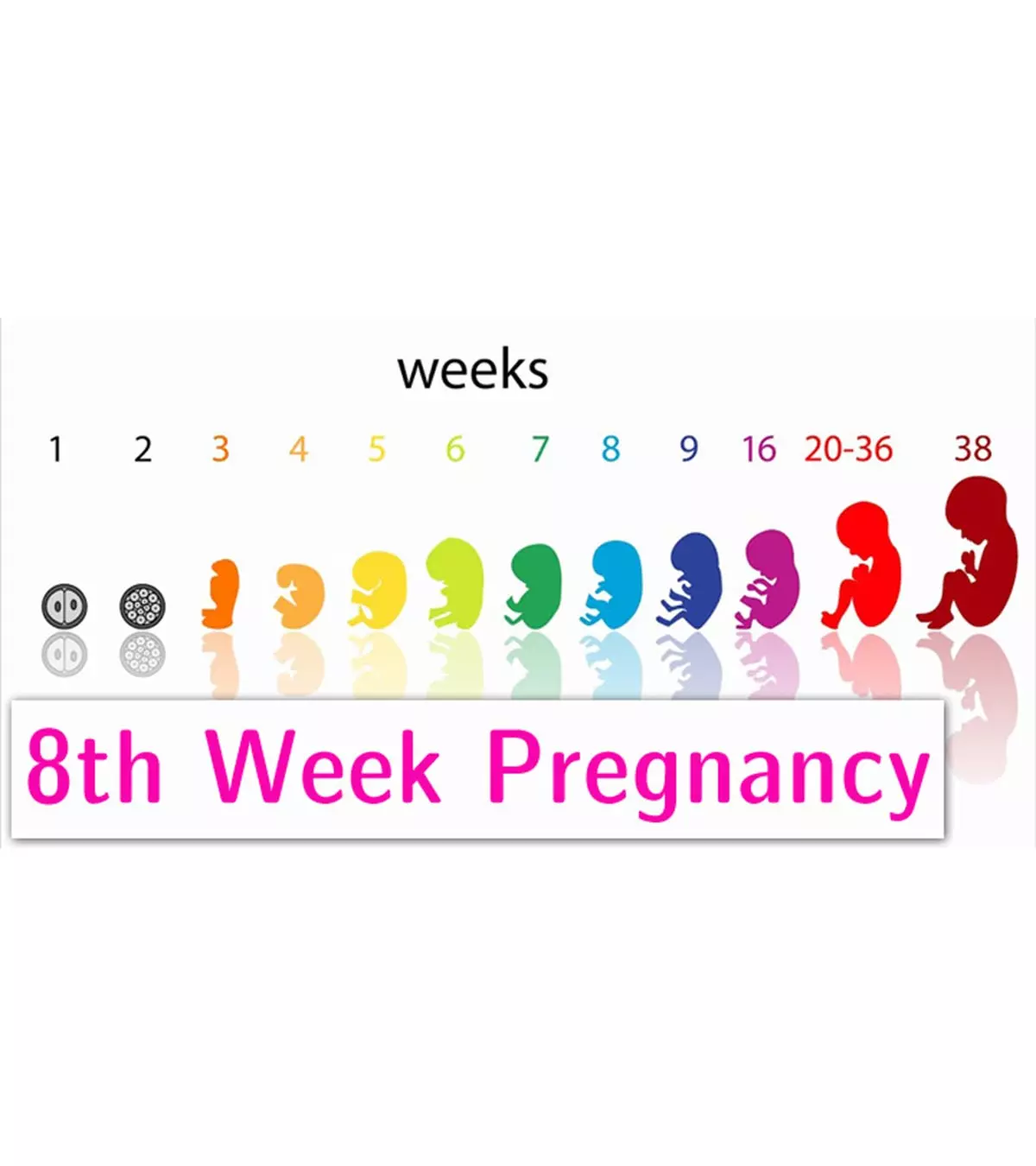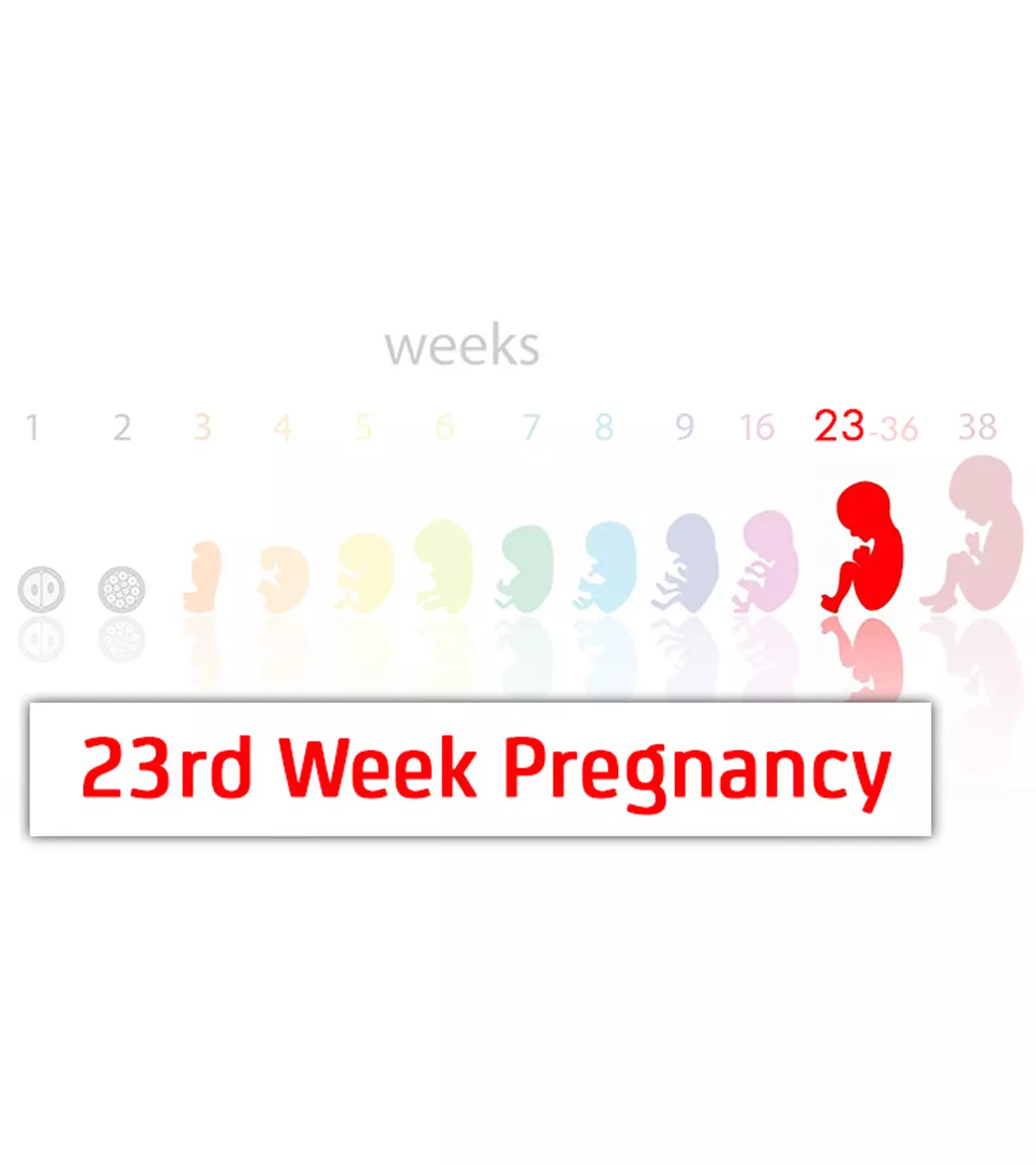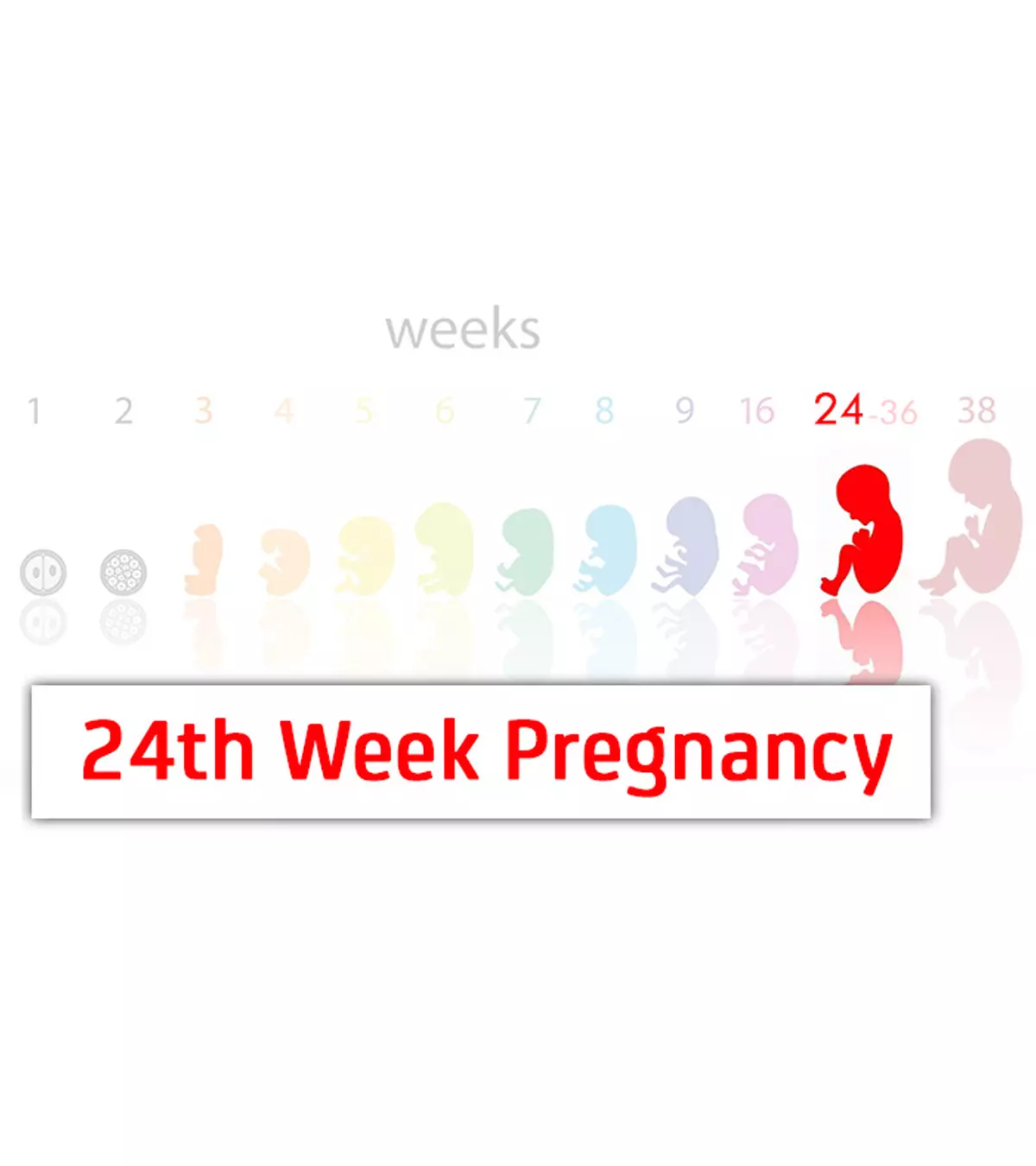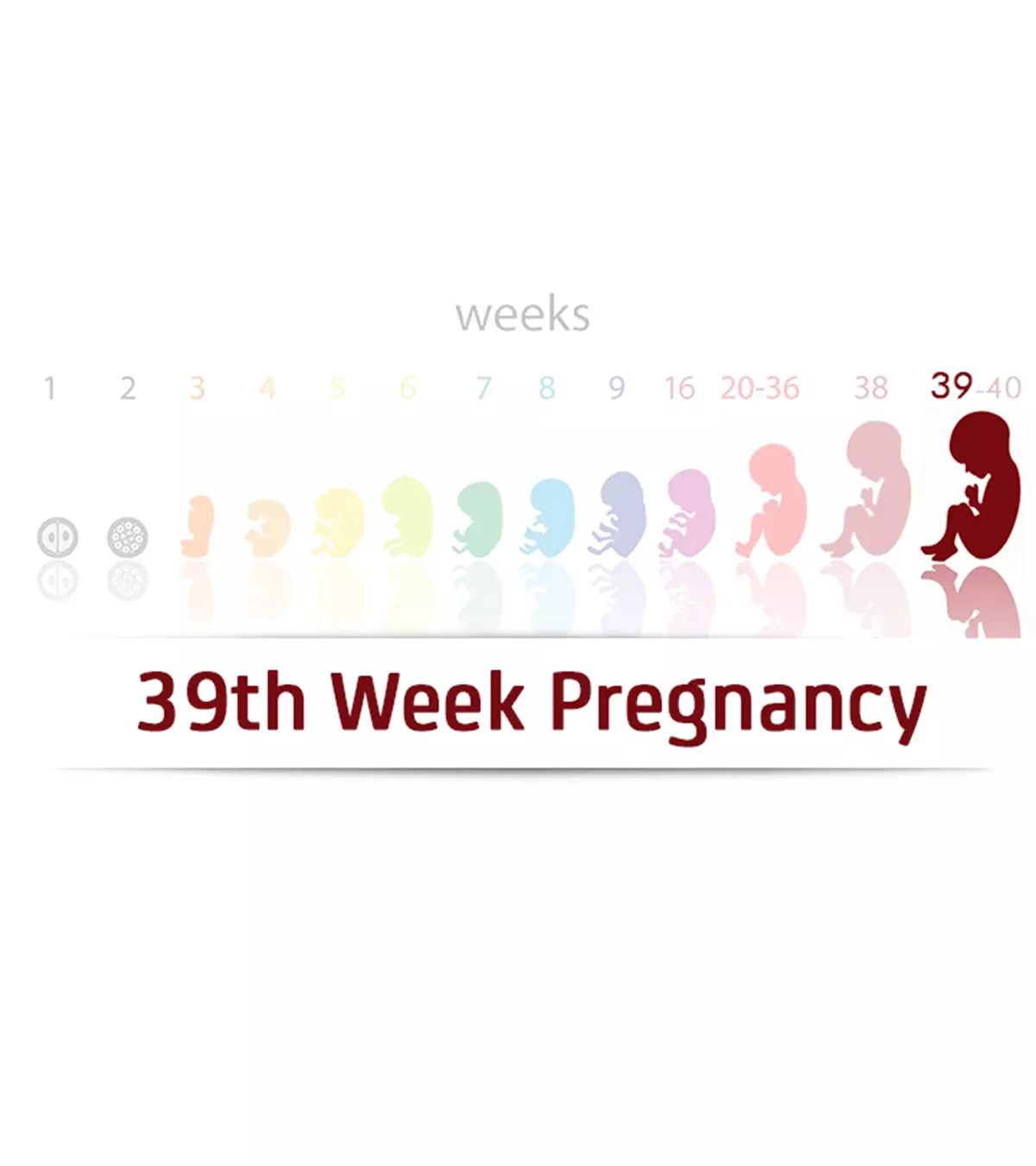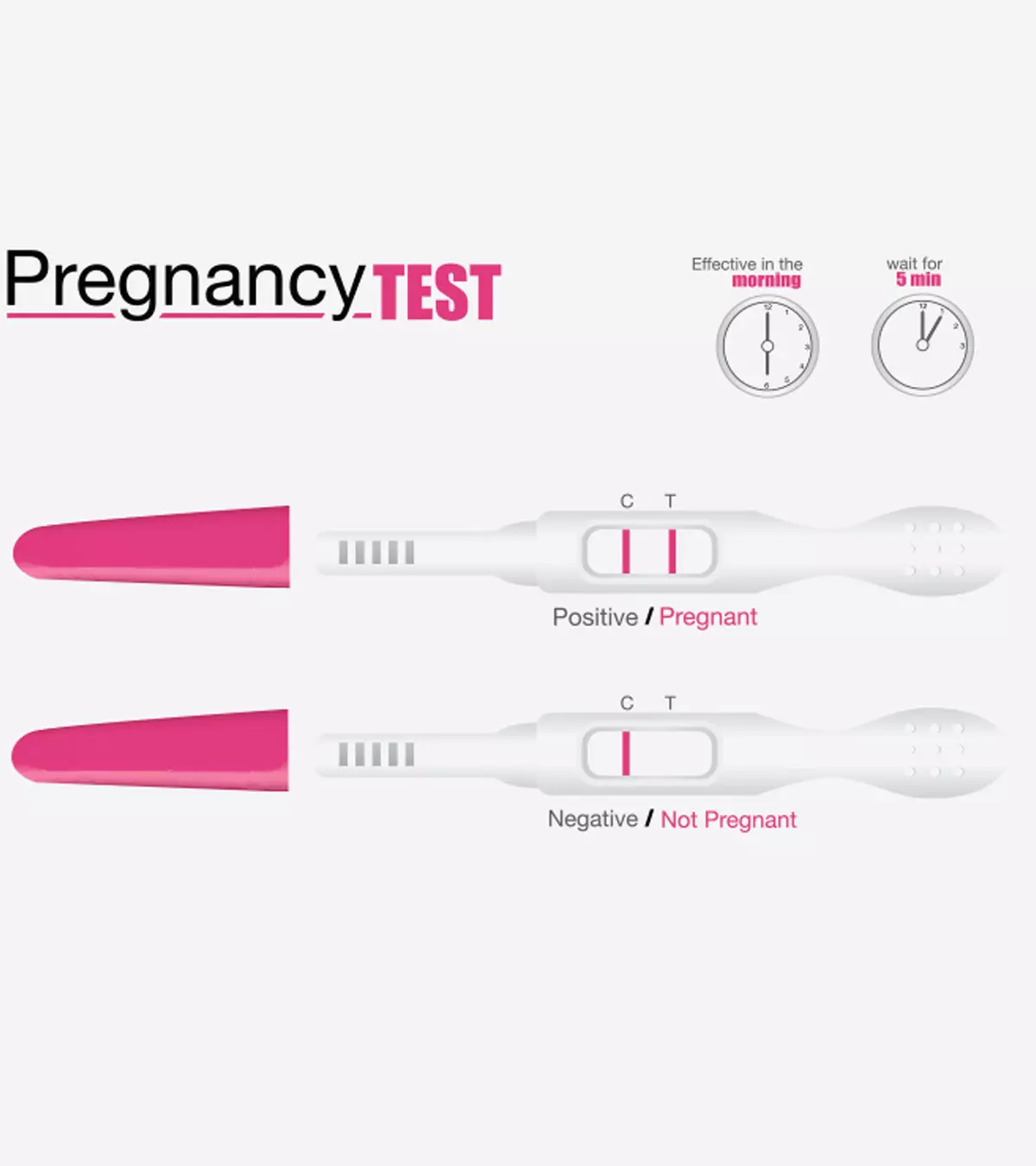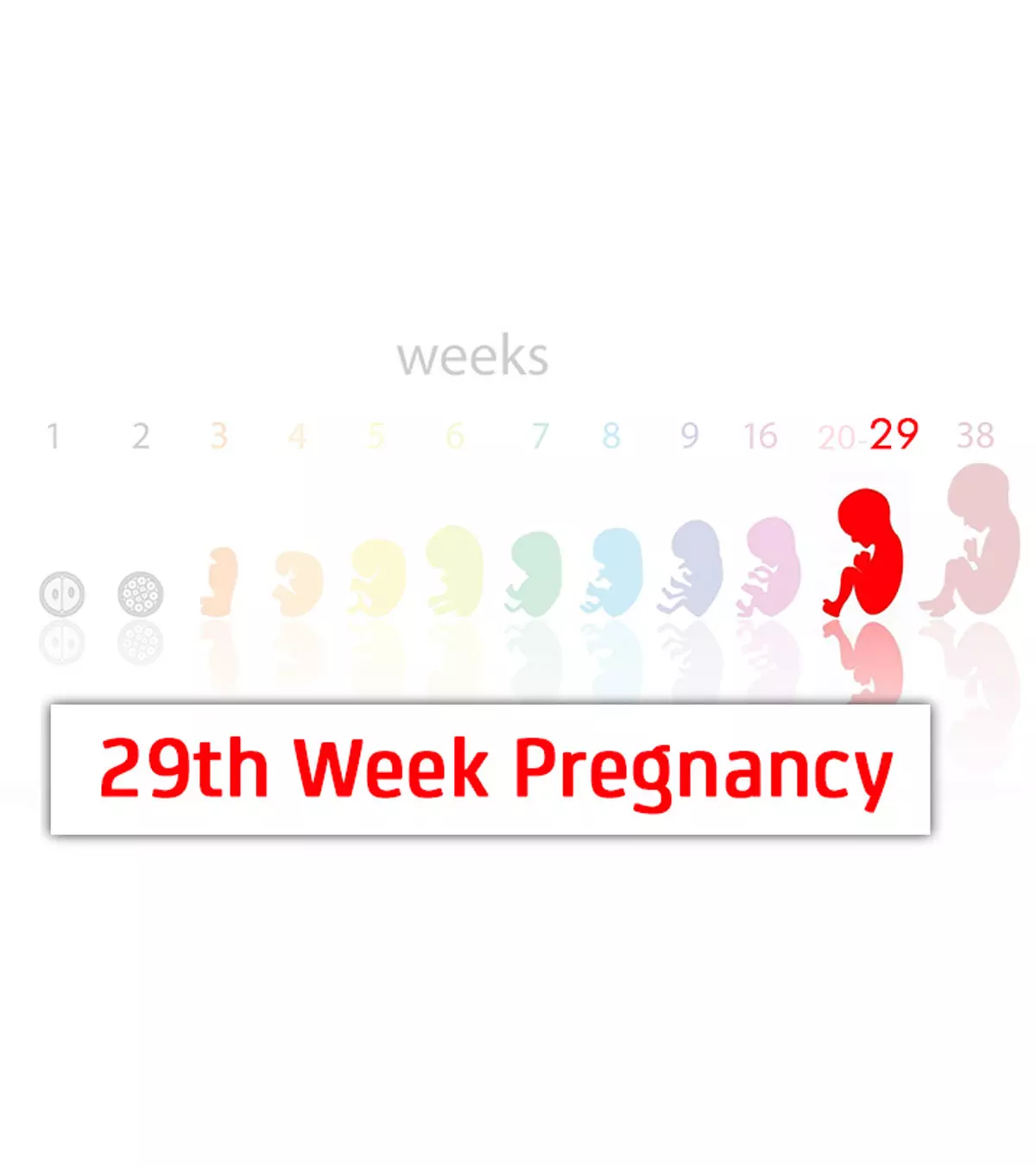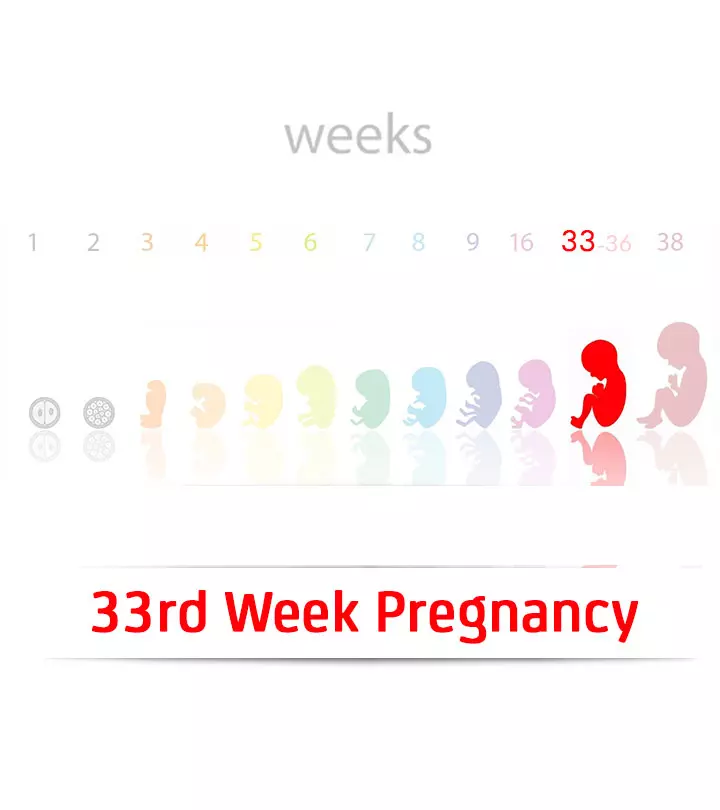
Image: Shutterstock

Key Pointers
- At 33 weeks, the baby is the size of a pineapple and is in a head-down position, pressing down on the cervix.
- The baby’s development at this stage includes the ability to open and close their eyes, almost fully mature lungs, and a fully developed brain and nervous system.
- The mother may experience symptoms such as weight gain, a high metabolic rate, headaches, and shortness of breath.
- The mother’s body undergoes drastic changes at 33 weeks, including an enlarged abdomen leading to stretch marks, darker areola, and mood swings.
- Regular prenatal checkups are necessary for monitoring weight, blood pressure, and fundal height.
- During this time, it’s important to avoid standing for long periods, stay calm and relaxed, stay hydrated, engage in moderate exercise, and get plenty of rest.
How Many Months Pregnant Are You At 33 Weeks?
At the 33rd week of pregnancy, you are about seven months and one week pregnant, which means you are in the eighth month of pregnancy.
How Big Is Your Baby At 33 Weeks?
In this week, your baby is the size of a pineapple (1). The baby will measure 17.2in (43.7cm) in length and weighs 4.23lb (1.92kg) (2).
Baby Development At 33 Weeks
By this week, the baby gets into a head down position and begins to press down into the cervix. Read on to know how the baby has developed so far.

| Body parts | Development stage |
|---|---|
| Eyes | The baby can open and close the eyes. Pupils can constrict and dilate in response to light. |
| Skin (3) | Thicker and less wrinkled. Fat continues to deposit beneath the skin layer. |
| Lungs (4) (5) | Are almost fully matured. Rhythmic breathing begins. |
| Brain and nervous system (6) | Fully developed. |
| Bones | Starts to harden, but the skull bones remain soft. |
| Limbs | Fully developed with legs curled up towards the chest. |
| Genitals | In boys, testicles descend into the scrotum. |
| Reflexes | The baby can feel, listen and see a little bit. |
The fetal or baby movements slow down by this week of pregnancy as there isn’t enough space inside the womb. As a result, the kick count will also be less this week, ideally around ten kicks in two hours. If you notice a significant drop in the number of kicks, tell your doctor about it.
The symptoms you have been experiencing in the past few weeks will persist this week as well. More about it next.
 Did you know?
Did you know?Symptoms Of Pregnancy At 33 Weeks
Here are the symptoms you may experience during the 33rd week of pregnancy:
- Weight gain: According to the American Pregnancy Association, weight gain should be as per your BMI (7).
| BMI | Below 18.5 | 18.5 – 24.9 | 25 – 29.9 | 30 and Above |
|---|---|---|---|---|
| Weight gain | 28-40lb | 25-35lb | 15-25lb | 11-20lb |
- As the body works extra to support the pregnancy, your metabolic rate gets higher and extra heat is generated in the body.
- Stress, dehydration, and hormonal balances can cause a headache.
- You could experience shortness of breath due to the pressure exerted by the enlarged uterus on the diaphragm.
- Lack of sleep or sleep deprivation, stress, and anxiety can cause forgetfulness, a phenomenon called pregnancy brain.
- The extra weight of the baby puts pressure on the lower back and causes back pain. Using hot and cold compress or taking a bath in warm water can help alleviate the back pain.
- Sciatica, which is an excruciating pain felt in the back and down in the back of the legs, is common when the growing uterus puts pressure on the sciatic nerves.

- The ankles and feet swell due to water retention in the body, also referred to as edema.
- Body aches and cramps make sleeping difficult during this time, resulting in insomnia.
- You could become clumsy due to the change in the center of gravity of your body.
- The enlarged uterus pushes the stomach upward, causing the gastric acids to move into the esophagus that leads to heartburn.
- Braxton-Hicks contractions are less painful and irregular contractions that help the body prepare for labor.
- The loosening of abdominal muscles and ligaments cause round ligament pain.
- Pregnancy hormones can make the nails grow faster and become brittle. Increasing your biotin intake can help prevent such changes in the nails.
- The excess blood flow to the lower part of the body can cause swelling of the blood vessels in the legs, a condition called varicose veins.
- The increased blood flow to the rectal area causes hemorrhoids, which is the swelling of the blood vessels.
- Carpal tunnel syndrome is the tingling or numbness in your fingers and wrists. Wearing a hand brace can help relieve the discomfort.
- Frequent urination is common due to the pressure exerted by the enlarged uterus on the bladder.
Apart from these symptoms, you will continue to experience bodily changes this week.
 Quick fact
Quick factChanges In The Body At 33 Weeks
The physical and emotional changes you might notice during this week include:
Physical changes:
- Enlarged abdomen from the enlarged uterus

- The areola becomes darker and starts leaking colostrum in preparation for breastfeeding.
- The abdomen stretches further, causing stretch marks, and becomes more sensitive and itchy. Applying a moisturizer can help relieve the itchiness of the belly to some extent.
Emotional changes:
- The anxiety level will be higher with increasing thoughts about labor pain and delivery.
- The hormonal fluctuations will make you moody and take a toll on your mental health.
- You develop nesting instincts and start preparations for welcoming the new member.
Since you are nearing the due date, chances of preterm labor exist this week.
Emotional changes are common during pregnancy. However, this emotional journey isn’t without its challenges. Dr. Rixa Freeze, a mother of four, opens up about her emotional experience during the 33rd week of her pregnancy. She says, “Physically I feel good. But emotionally–another story. It seems that this pregnancy has been a long, hard episode of constant anxiety and fear, punctuated by occasional moments of calm and peace. I worry worry worry all the time: will this baby make it? will I end up with a c-section? Those two are the Big Ones for me. I am absolutely positively terrified of having a c-section. I know it’s not really a big deal for some women but it’s basically my personal worst nightmare. I’m tired of this fruitless worry and constant fretting but haven’t quite figured out how to shake it for good (i).”
Preterm Labor At 33 Weeks Of Pregnancy
Labor before 37 weeks of pregnancy is termed preterm. Some of the signs of preterm labor include (8):
- Menstrual-like cramps
- Abdominal pain
- Lower backache
- Change in vaginal discharge (pink or bloody in color)
- Vaginal fluid leak
- Pelvic pressure
- Uterine contractions (five or more in one hour)
If you have more than five contractions in an hour or the time between the contractions is less than 10 minutes, then:
- Keep your bladder empty
- Drink a lot of fluids
- Lie on the left side for an hour and check the timing of the contraction.
If the contractions persist, then call your doctor right away as it may be an indication of preterm labor.

Your Ob/Gyn Visit
During this week’s prenatal check-up, the doctor will check for:
- Weight
- Blood pressure
- Fundal height
You also need to get an ultrasound scan.
In the case of twin pregnancy, there will be frequent visits to the doctor as they need to monitor the babies closely. The doctor will focus on your diet and nutrition and tell you about the ideal weight gain. As there is also a risk of gestational diabetes, high blood pressure and anemia in multiple pregnancies, the doctor monitors your health condition on a regular basis.
As you are 33 weeks pregnant, ensure you discuss crucial topics with your healthcare provider (9):
- Discuss any problems or changes in your well-being since the last visit.
- Share feelings and address any concerns about pain, uterine cramping, or vaginal bleeding.
- Report any swelling on your face or ankles, headaches, or vision changes.
- Mention any discharge or fluid leakage from the vagina.
- Note changes in fetal movement frequency or intensity.
- Inquire about signs of labor and when to contact the doctor.
- Confirm plans for feeding (breast or bottle) and pediatrician selection.
- Ensure arrangements for the baby’s car seat and discuss circumcision preferences.
- Discuss hospital stay duration and signifying signs of labor.
Remember, open communication is crucial for a healthy pregnancy.
Healthy regimes should not be overlooked even as you are nearing your due date. You should practice healthy habits for a healthy baby and a speedy recovery postpartum.
Tips For Mom-to-be
- Avoid standing for long to prevent fatigue.
- Avoid lying on the back.
- Drink a lot of water to stay hydrated.
- Stay calm and relaxed.
- Follow a healthy diet, eat home-cooked meals. Have smaller meals at regular intervals to deal with pregnancy cravings and eat fiber-rich foods such as plums and apricots.
- Continue taking your prenatal vitamins.
- Avoid lifting heavy objects.
- Engage in regular and moderate exercises like walking. Practice Kegel exercises to strengthen the pelvic floor muscles.

- Wear loose, comfortable maternity clothes.
- Get lots of rest.
- Plan your maternity leave.
- Read pregnancy or parenting-related books to prepare for the baby’s arrival.
- Search through baby names that you and your partner like.
- Enroll in childbirth classes.
- Do shopping for yourself and get essential baby gear for the newborn.
- Start packing your maternity bag and ensure that you also have everything for diaper changes once the baby arrives.
- Spend quality time with friends and family.
- Plan for hosting a baby shower around this week.
- Prepare a baby registry to help family and friends know what items you need and want for your new baby.
Frequently Asked Questions
1. Why is my belly so hard at 33 weeks pregnant?
As your baby grows, your abdominal wall stretches, making your belly feel firm. However, if you are in your second and third trimester, the occasional tightening or hardening of the belly could be due to Braxton Hicks contractions (false contractions). These less painful and irregular contractions prepare your body for labor and delivery (10).
2. How long do babies sleep in the womb at 33 weeks of pregnancy?
From around 22 weeks, babies start developing a sleeping pattern in the womb. Studies suggest that later in pregnancy, babies spend almost 90 to 95 percent of their time sleeping (11) (12).
3. Can I give birth to twins at 33 weeks?
Childbirth post 37 weeks of pregnancy is considered full-term. Usually, the average gestational age at the time of delivery for a twin pregnancy is 35 weeks. However, depending on several factors, such as maternal and fetal health, mothers can deliver twins at 33 weeks (13). Babies born this early would need extra medical care for better health outcomes.
The 33rd-week pregnancy has the baby occupying more space in your tummy as the fetus is almost fully developed. You are in the eighth month of gestation, just a few weeks away from holding your bundle of joy. Increased pressure on other organs, causing heartburn, difficulty breathing, frequent urination, edema, and back pain are symptoms of this week. You may feel moody and lethargic due to all the discomfort. However, you should take care of yourself and report to your doctor for any unusual symptoms that may indicate preterm labor or other complications.
Infographic: Infographic: Signs Of Preterm Labor At 33 Weeks Of Pregnancy
Your baby bump will be more noticeable during the 33rd week of your pregnancy, and you’ll look forward to holding your little angel. However, one of the pregnancy concerns you should be careful about at this stage is preterm labor. Check out this infographic for the preterm labor sign you must be watchful for during this week. Illustration: Momjunction Design Team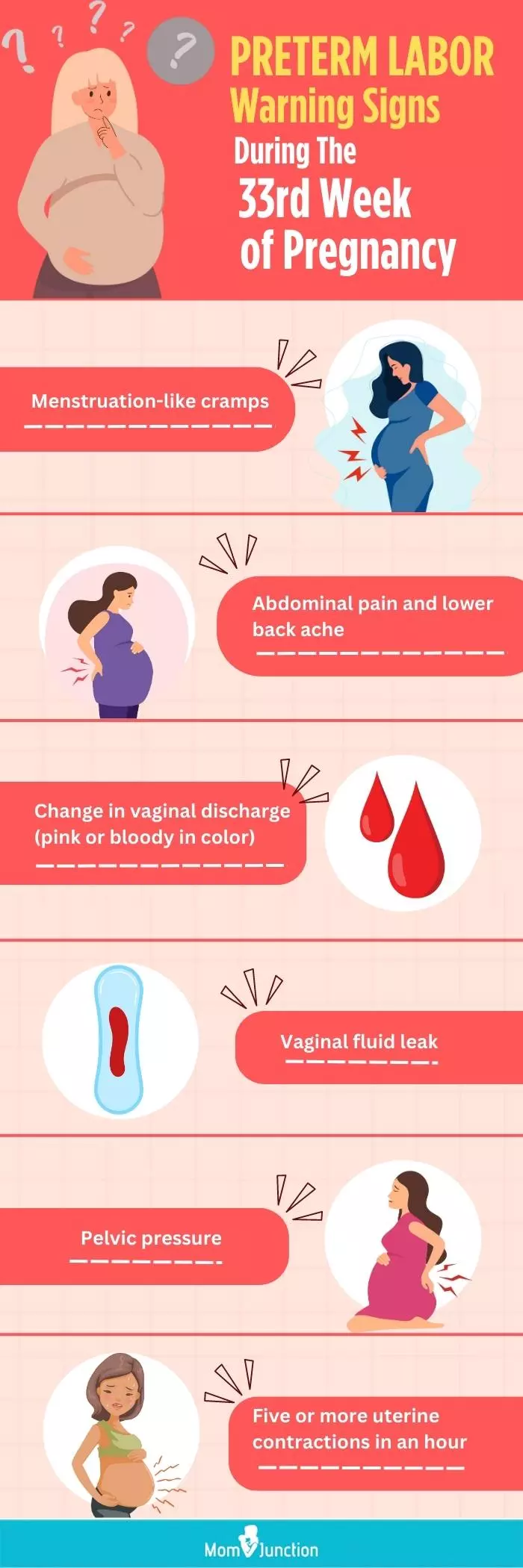
Illustration: 33 Weeks Pregnant: Signs Baby Development Milestones & Tips
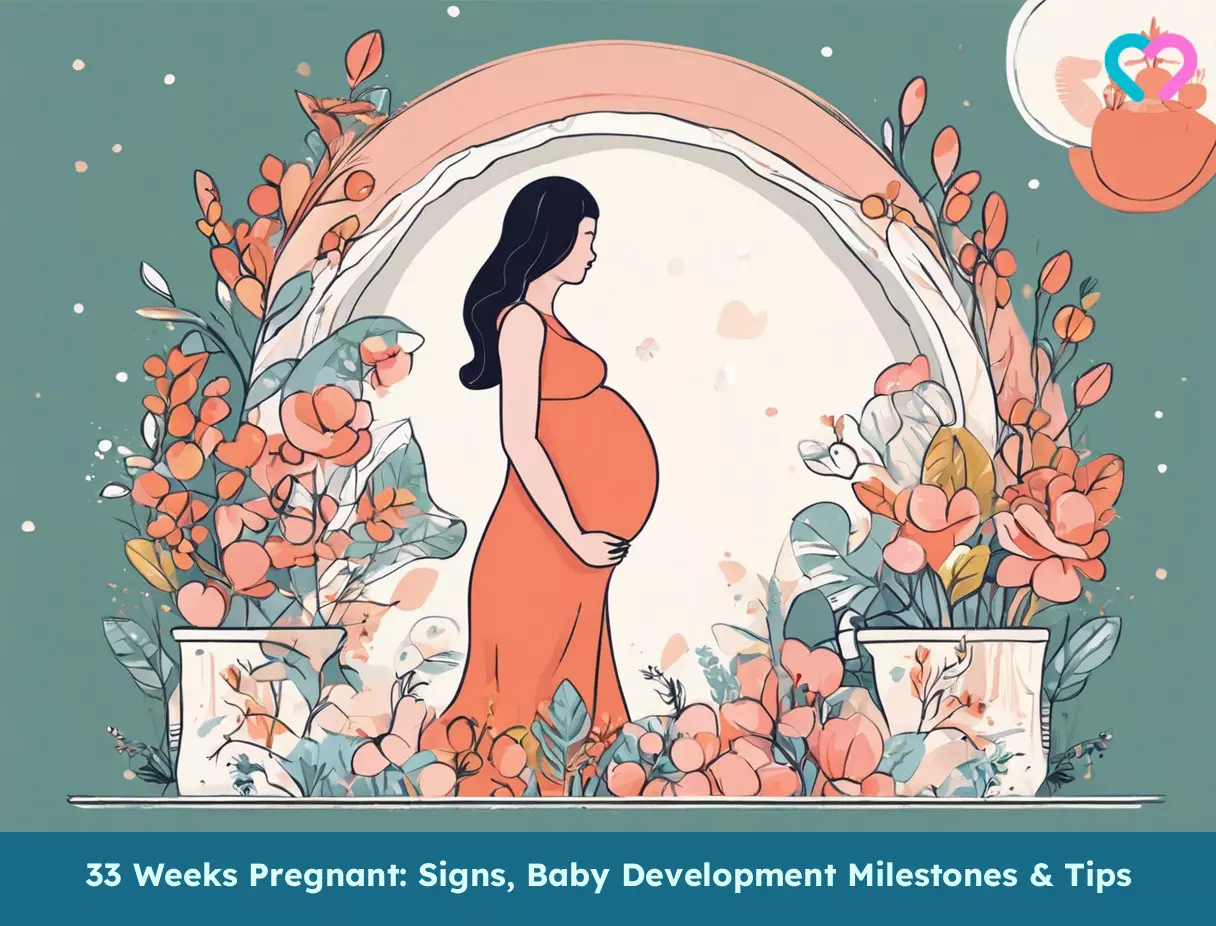
Image: Stable Diffusion/MomJunction Design Team
A fascinating look at the world of dreaming in the womb! See a 33 week fetus as it dreams and explore the mysteries of the unborn.
Personal Experience: Source
MomJunction articles include first-hand experiences to provide you with better insights through real-life narratives. Here are the sources of personal accounts referenced in this article.
i. Belly shot: 33 weeks pregnant;https://rixarixa.blogspot.com/2009/03/belly-shot-33-weeks-pregnant.html
References
- Week by Week Fetus Size Demonstrated by Fruits; EPAOA
https://epaoa.org/redirect/?utm_source=redirect - Hill M; Embryology Fetal Development; UNSW Embroylogy 2018
https://embryology.med.unsw.edu.au/embryology/index.php/Fetal_Development - Pregnancy calendar Week 33; Nutricia
https://www.cgbabyclub.co.uk/article/33-weeks-pregnant - Pregnancy calendar Week 33; KidsHealth
https://kidshealth.org/en/parents/week33.html - Fetal development; US National Library of Medicine
https://medlineplus.gov/ency/article/002398.htm - You and your baby at 33 weeks pregnant; NHS
https://www.nhs.uk/pregnancy/week-by-week/28-to-40-plus/33-weeks/ - Weight Gain During Pregnancy; American Pregnancy Association
https://americanpregnancy.org/healthy-pregnancy/pregnancy-health-wellness/pregnancy-weight-gain/ - Premature Labor.
https://www.sutterhealth.org/health/what-is-premature-labor - When You Visit Your Doctor – Pregnancy: 3rd Trimester; Harvard Health
https://www.health.harvard.edu/womens-health/when-you-visit-your-doctor-pregnancy-3rd-trimester - What Causes My Belly to Feel Hard and Tight?; Lamaze International
https://www.lamaze.org/Giving-Birth-with-Confidence/GBWC-Post/what-causes-my-belly-to-feel-hard-and-tight - You and your baby at 22 weeks pregnant; NHS
https://www.nhs.uk/pregnancy/week-by-week/13-to-27/22-weeks/ - Adrián Poblano et al.; Neurophysiologic Measurement of Continuity in the Sleep of Fetuses during the Last Week of Pregnancy and in Newborns; NCBI
https://www.ncbi.nlm.nih.gov/pmc/articles/PMC2140151/ - Twin Pregnancy: Answers from an Expert; Johns Hopkins Medicine
https://www.hopkinsmedicine.org/health/conditions-and-diseases/staying-healthy-during-pregnancy/twin-pregnancy-answers-from-maternal-fetal-medicine-specialist - 33 weeks pregnant
https://raisingchildren.net.au/pregnancy/week-by-week/third-trimester/33-weeks - Week-by-week guide to pregnancy
https://www.nhs.uk/start-for-life/pregnancy/week-by-week-guide-to-pregnancy/3rd-trimester/week-33/
Community Experiences
Join the conversation and become a part of our nurturing community! Share your stories, experiences, and insights to connect with fellow parents.
Read full bio of Dr. Christian Pope
Read full bio of shreeja pillai
Read full bio of Rebecca Malachi
Read full bio of Aneesha Amonz





